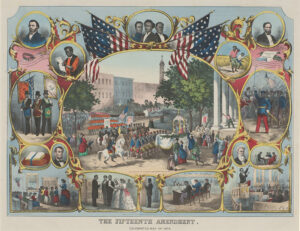Indiana’s Ratification of the Reconstruction Amendments

Here’s more of the story. After the Civil War, three amendments were passed to the Constitution that together formed the largest change in American governance since the Bill of Rights. These three amendments, sometimes called the Second Bill of Rights, they were the first amendments to be added to the Constitution since 1804. The 13th legally ended slavery in the United States, while the 14th, among many other things, established birthright citizenship and said that equality of the law and due process should be extended to all citizens. The 15th amendment gave Black men the right to vote. These amendments provoked very different responses. The 13th passed in the waning months of the Civil War and legally outlawed slavery. In Indiana, this did not cause a great deal of controversy, and the state passed the resolution to ratify within about a week. The 14th amendment generated a bit more debate, but it was seen as applying mostly to the Southern states, and so it passed without too much difficulty as well. The 15th amendment, however, was different. That gave Black men the right to vote and the stakes were seen as being very high. The Indiana legislature scheduled a vote for March 4th of 1869, but before the vote could be taken, 17 senators and 37 representatives from the Democratic Party all resigned their seats. In response, Governor Conrad Baker called a special election for March 23rd. Most of the legislators were reelected. They agreed on a new date for the vote, but before that could take place 10 senators and 41 representatives again resigned. Some of those senators, however, remained in the chambers, and so a debate followed about what constituted a quorum. It was decided that because some of them were present, that a quorum was in place, and business could proceed. A vote was taken, and with most of the opponents gone, it passed. While there was later debate about whether Indiana really ratified the 15th Amendment, it was recorded in the yes column, and on February 3rd 1870, finally Black men in the United States had the right to vote.








